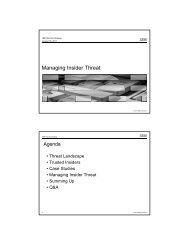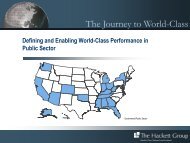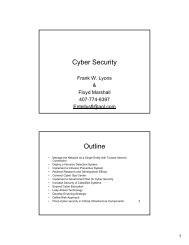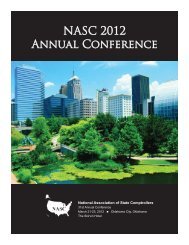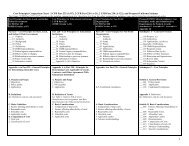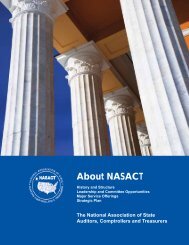Advisory Committee on Tax Exempt and Government Entities (ACT ...
Advisory Committee on Tax Exempt and Government Entities (ACT ...
Advisory Committee on Tax Exempt and Government Entities (ACT ...
You also want an ePaper? Increase the reach of your titles
YUMPU automatically turns print PDFs into web optimized ePapers that Google loves.
The Appropriate Role Of The Internal Revenue Service With Respect To <strong>Tax</strong>-<strong>Exempt</strong> Organizati<strong>on</strong> Good Governance Issuessector, but also to inappropriately suggest to the public <strong>and</strong> watchdog groups thatthe absence of specific governance policies or practices is in effectmisgovernance. The harm that can arise from the IRS appearing to m<strong>and</strong>atespecific practices can, however, be minimized by the manner in which thequesti<strong>on</strong> is asked. While no questi<strong>on</strong> is truly neutral, we recommend thatquesti<strong>on</strong>s be asked in the most neutral <strong>and</strong> least value-laden manner possible.For example, “Is a majority of your governing body comprised of independentpers<strong>on</strong>s?” is a loaded questi<strong>on</strong>, whereas asking, as the redesigned Form 990does, about the number of voting members <strong>on</strong> the governing board <strong>and</strong> thenumber of voting members that are independent is a significantly more neutralapproach; although each inquiry suggests, to varying extents, that it is desirableto have independent governing body members. In each case, the IRS shouldc<strong>on</strong>sider the best way to address a governance inquiry <strong>and</strong> then whether theprospective benefits hoped to be obtained from asking a questi<strong>on</strong> in the preferredway sufficiently outweighs the potential harms. The answer may suggest inspecific cases that even the most central governance questi<strong>on</strong> should not beasked.On balance, we believe the governance questi<strong>on</strong>s <strong>on</strong> the redesigned Form 990for 2008 are relatively neutral; in additi<strong>on</strong>, charities do have an opportunity toexplain any answer <strong>on</strong> Schedule O. There are, however, questi<strong>on</strong>s that wewould recommend be rephrased to more effectively promote compliance <strong>and</strong> torecognize the differences am<strong>on</strong>g exempt organizati<strong>on</strong>s, such as the inquiryrelating to whether a copy of the Form 990 was provided to the organizati<strong>on</strong>’sgoverning body before it was filed. Asking an organizati<strong>on</strong> to describe theprocess, if any, used to review the Form 990 is a less value laden inquiry thanwhether a copy of the Form 990 was provided to the organizati<strong>on</strong>’s governingbody before it was filed, although both are asked <strong>on</strong> the redesigned Form 990 fortax years beginning in 2008. Pre-filing review may be an acceptable approachfor some organizati<strong>on</strong>s, but it is not necessarily the best approach for allorganizati<strong>on</strong>s. The Form 990 is a sizeable <strong>and</strong> complicated document that isladen with technical terms <strong>and</strong> code or regulati<strong>on</strong> secti<strong>on</strong>s. The volunteergoverning body for a small organizati<strong>on</strong> may feel overwhelmed by the obligati<strong>on</strong>to “review” the form, may expend limited resources that are better utilized forcharitable purposes to have professi<strong>on</strong>als assist the governing body, may bec<strong>on</strong>cerned about potential liability, or may be deterred from service as governingbody members. In the case of large, complex organizati<strong>on</strong>s comprised ofmultiple entities, governing board members are likely to be overwhelmed by thequantity of paper, may miss the key aspects of the returns due to an inability to“see the forest from the trees,” <strong>and</strong> also may be c<strong>on</strong>cerned about whether theirreview subjects them to liability in the case of errors <strong>and</strong> thereby expendunnecessary external resources or be deterred from service. In this latter case, abetter practice may be for management to cull the sensitive informati<strong>on</strong> in theForms 990 <strong>and</strong> to present that informati<strong>on</strong> to the governing body, or a committeeof the governing body.ADVISORY COMMITTEE ON TAX EXEMPT AND GOVERNMENT ENTITIES (<strong>ACT</strong>) June 11, 2008 52






